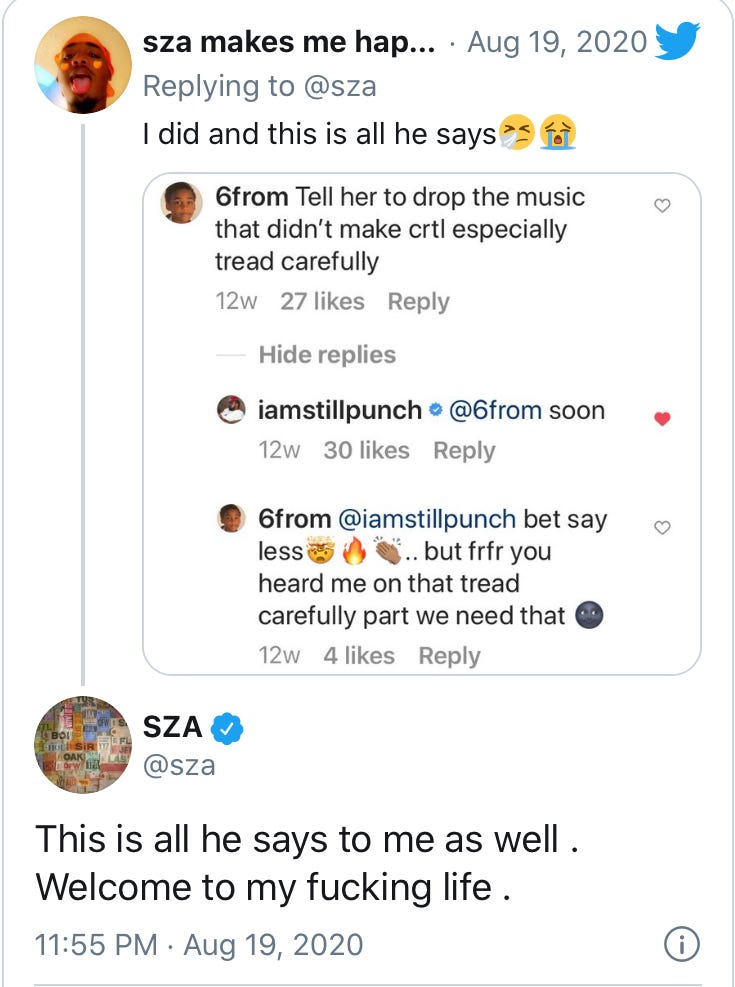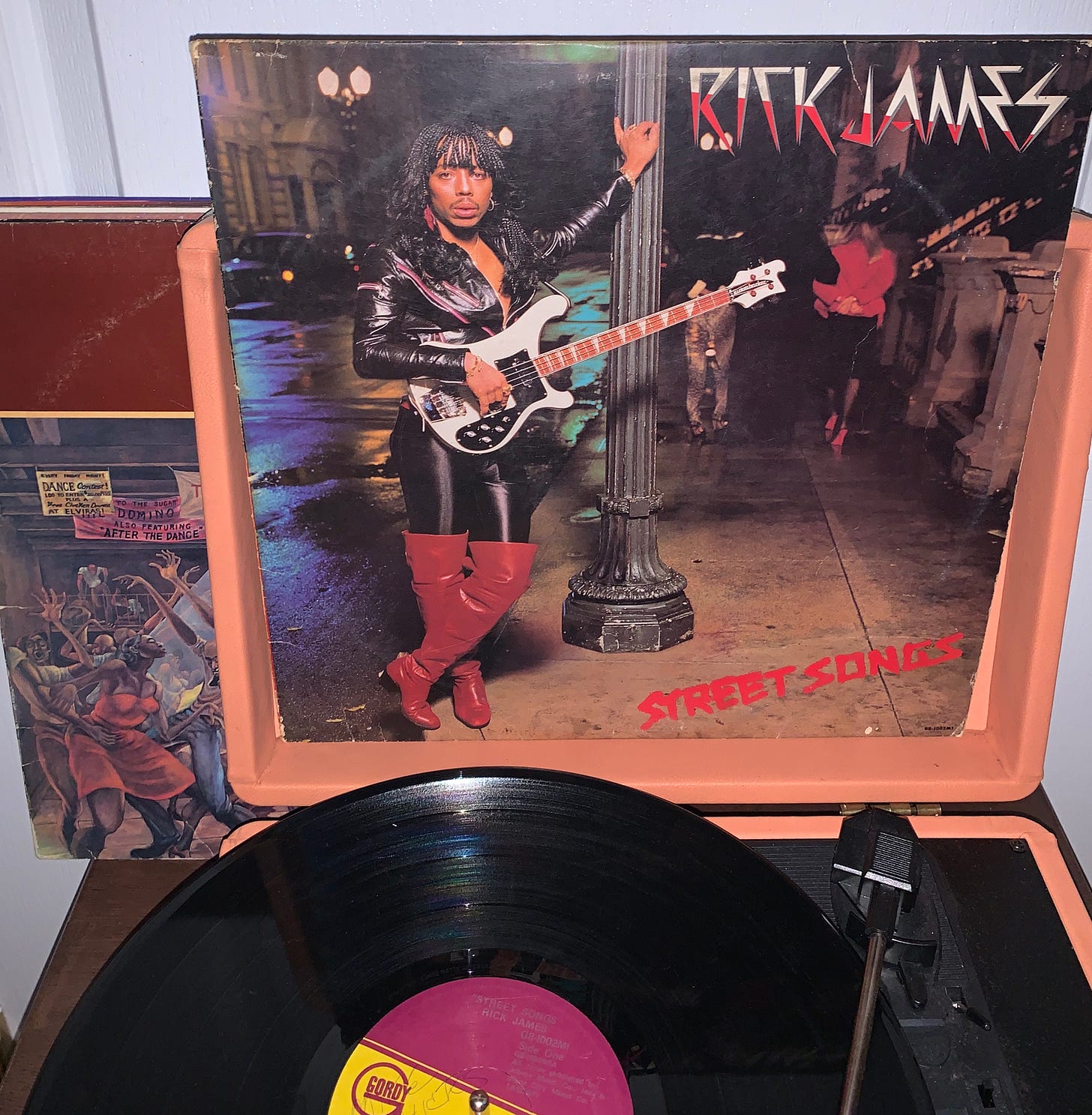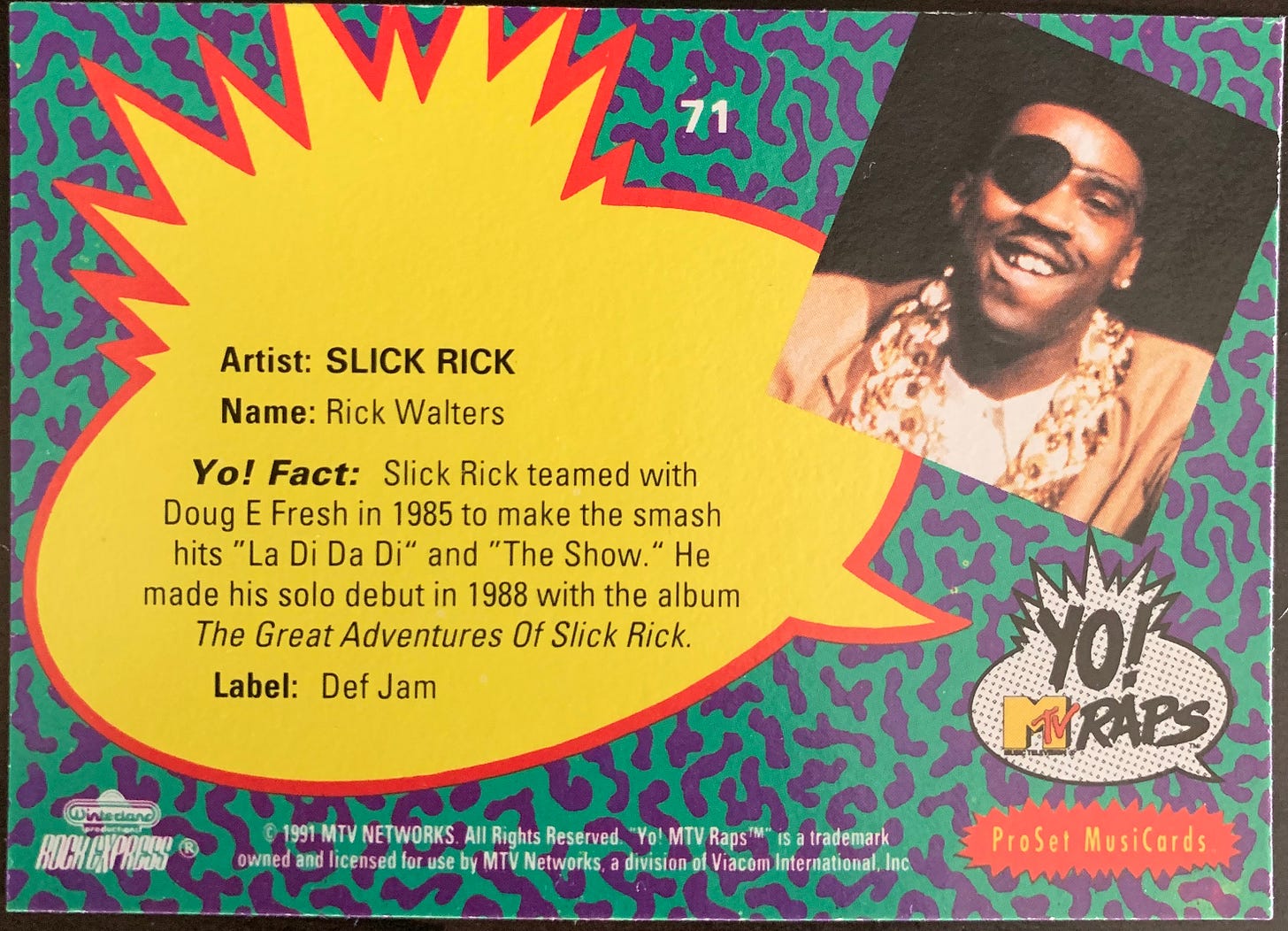SZA, Blink Twice if TDE is Holding Your Music Hostage
Issue # 003 (the A/B-Side): those with power make the decisions...
A-Side
Today marks 1,169 days since Top Dawg Entertainment/RCA Records released SZA's debut studio album, Ctrl. I specify that her label, TDE, released the record because the singer, born Solána Rowe, told The Guardian they essentially cut her off from working on it:
They just took my hard drive from me. That was all. I just kept fucking everything up. I just kept moving shit around. I was choosing from 150, 200 songs, so I'm just like, who knows what's good any more?
The tension between the singer and her label was already building. Just eight months before, SZA tweeted out of frustration, "I actually quit," tagging Punch, the president of TDE.
Thankfully she didn't quit. Ctrl, an incredibly intimate, vulnerable, and most importantly, specific look at self/self-esteem, Black womanhood in your twenties, and relationships, came out the summer after my sophomore year of college. I worked as a counselor & residential assistant for an academic boarding program and lived on a dorm floor with 20+ 9th graders. I played music loudly but always kept my door closed so I didn't disturb them too much. Ctrl escaped from my speakers and filled my room, and I fell deep into the stories SZA crafted like I was listening to a close friend. A knock on my door interrupted the session, and a group of girls stood in my doorway like:

SZA received five nominations at the 2018 Grammy Awards, and Ctrl was certified 2x Platinum by the Recording Industry Association of America last month. Still, when music moves from an individual experience to an unexpected collective one, it's those memorable moments, like what I shared with my students, that certifies a classic for me. In an age where the industry rewards quantity, music quality is the first to suffer, and as a result, bodies of work tend to lack long-term replay value.
Ctrl, however, has managed to remain in the public's consciousness for three years, but fans are growing impatient, and rightfully, so is SZA. After a fan questioned her about her new music's status this week, Rowe replied, "At this point y'all gotta ask punch. I've done all I can do🙏🏾."

She followed up, admitting that this tension is not new, that the label has "BEEN hostile" toward her.
Three years ago, SZA was nervous and couldn't decide on how she wanted the album to sound, so TDE took it and released it anyways. Now, with music finished that she's ready to share with the world, the label is holding it up with no explanation. Artists may hold their own genius and create the work, but those with real decision-making power continue to wage control.
SZA deleted some of the tweets and changed her tune on Thursday:
Lmao when u don't get somewhere By urself u can't always make ALL the decisions by urself. And das okay 🥺 Sometimes u gotta be patient .. sometimes no is a blessing.. 🤷🏾♀️ i trust the ppl around me.
SZA, blink twice if TDE is holding your music hostage. Maybe she deleted the tweets because she genuinely believes she needs to be patient. Most likely, someone at the label reminded her that you don't put "family" business out in the street. Either way, it's clear that she is fed up, and we remain unsure if and when we're getting new music from the first lady of TDE, or any artist on the Top Dawg Entertainment roster, for that matter. In July, Punch clarified via Twitter that soon "is a mysterious word. It could mean tomorrow or it could mean January 2030."
What are the effects of constantly being reminded that your creative output has value, but that you have no control over how and when it enters the world, that you have no autonomy at all—no freedom to share it with those who will find pieces of themselves in it and build community around it?
SZA is just the latest example that reminds us that artists have very little autonomy in the music industry unless they are independent. Executives with authority arrive at decisions without artists' input, deciding when to release music or shelving it indefinitely—in SZA's case, keeping her in the dark, along with her fans. I'll probably sound like a broken record throughout this newsletter's future because this is just another reminder that this industry is called the music *business* for a reason.
B-Side
What’s the 411?
Jenzia Burgos created The Black Music History Library, a “living collection of books, articles, documentaries, series, podcasts and more about the Black origins of traditional and popular music dating from the 18th century to present day.” You can discover resources from almost every genre ranging from Hip-Hop, R&B/Soul, and Reggae to Classical, Folk & Country, Minstrelsy, Rock, and more.
Tweet of the Week:
First Lady of TDE in Ctrl
Since fans allege that Punch is holding SZA’s music hostage, we don’t have a choice but to run these songs back.

From the Archives
I found Rick James’ Street Songs record in my grandparents’ collection from the 80s. The 1981 record is James’ 5th album, featuring popular songs like “Give It To Me Baby” and “Super Freak.” In 1982, Rick James became the first African American male artist to receive a nomination for Best Male Rock Vocal Performance for “Super Freak,” the first song listed on the album’s B-Side. He won his first Grammy Award (for Best R&B Song) a decade later after suing MC Hammer for a songwriting credit on “U Can’t Touch This” which samples “Super Freak.”

Slick Rick, obviously not to be confused with Rick James, is this week’s pick from my 1991 Yo! MTV Raps card collection.

The Credits
Shoutout to you if you made it this far! This newsletter is free, so the best way to support is to let me know what you think and to share A-Side/B-Side with a friend.




